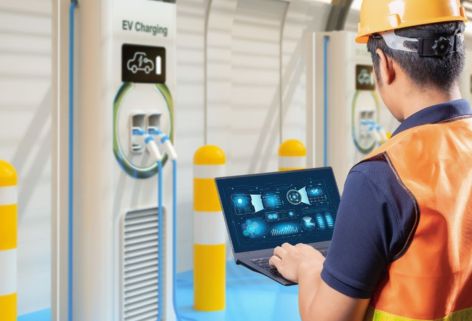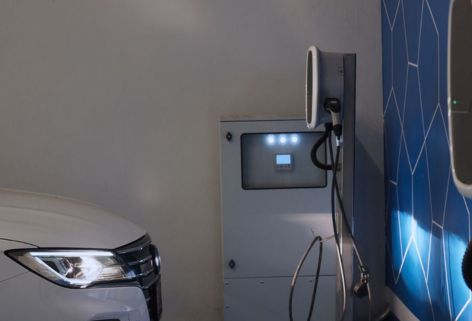EV Charging Station
Rise of EV Charging Stations.
EV charging station at home, workplace or even as a business is becoming the new normal. Our team is ready to provide expert guidance and help you find the perfect charging solution.

Types of EV charging stations
Level 1
Delivers up to 2 kW
8 to 12 hours Charging Time
for Homes
Level 2
Delivers up to 19.2 kW
2 to 8 Hours Charging Time
for Workplaces
Level 3
Delivers up to 350 kW
20-30 minutes Charging Time
for Public EV Charging Stations
where are they used?
Home
Workplace
Public Areas
services we offer
EV Charging Station Installation
This involves evaluating the client's needs, recommending suitable charging station models, handling the electrical work.


Consultation and Planning
This involves assessing factors such as site requirements, charging station placement, load management, and scalability.
Customized Charging Solutions
This involves developing charging infrastructure for commercial properties, residential complexes, fleet management, or public spaces.


Maintenance and Support
This includes regular inspections, repairs, software updates, and troubleshooting to ensure the smooth functioning of the charging infrastructure.
case study
FSE Tesla EV Charging Project
Benefits of having AN ev charging STATION Business
• Attract and Retain Customers
EV charging stations can draw in electric vehicle owners, helping you attract and retain eco-conscious customers.
• Enhance Customer Experience
Offering convenient charging facilities improves the overall experience for visitors, encouraging them to stay longer and potentially make additional purchases.
• Positive Brand Image
Providing EV charging demonstrates your commitment to sustainability, fostering a positive brand image and attracting environmentally conscious customers.
• Revenue Generation
Monetizing the charging service can create an additional revenue stream for your business.
• Future-Proofing
Having EV charging infrastructure positions your business for the future as the transition to electric vehicles continues to grow.
• Sustainability
By supporting electric vehicles, you actively contribute to reducing greenhouse gas emissions and promoting a greener future.
Benefits of ev charging STATION at workplace
• Employee Attraction and Retention
EV charging stations can attract environmentally conscious employees and improve satisfaction and retention.
• Convenience
Charging at the workplace saves employees time and eliminates the need to find public charging stations, enhancing convenience and productivity.
• Green Image and CSR
EV charging infrastructure showcases your commitment to sustainability and corporate social responsibility.
• Future-Proofing
Having EV charging stations positions your organization for the growing electric vehicle market and transportation trends.
• Emissions Reduction
Charging at the workplace reduces greenhouse gas emissions and promotes a greener environment.
• Cost Savings
Employees may save on charging costs compared to public options, and offering this amenity can be seen as a valuable employee benefit.
Benefits of EV Charging STATION at Home
• Convenience
Home EV charging provides convenient access to charging, saving you time and effort.
• Cost Savings
Charging at home can be more cost-effective than using public stations, potentially saving on electricity and fuel costs.
• Flexibility
With a home charging station, you have the flexibility to charge your vehicle whenever you need to, ensuring you start each day with a full or near-full charge.
• Time Savings
Home charging allows you to multitask and save time by charging while you attend to other tasks or activities.
• Range Confidence
Having a home charging station alleviates range anxiety, providing peace of mind and sufficient range for your daily needs.
• Energy Management
Smart charging features enable optimized energy consumption and potentially lower electricity costs.
• Property Value
Installing an EV charging station can increase the market value and attractiveness of your home.
FAQ for Home & Workplace EV charger
1.Can I install an EV charger at my home or workplace if I don't have a dedicated parking space?
Generally, EV chargers require a dedicated parking space to ensure safe and convenient charging. However, some alternatives might be available, such as shared charging stations in multi-unit residential buildings or workplace charging programs that provide designated spaces for EV charging.
2.What electrical requirements are needed for installing an EV charger at a home or workplace?
EV chargers typically require a 240-volt electrical circuit, commonly known as a Level 2 charger. This requires professional installation by a licensed electrician to ensure proper wiring, circuit capacity, and electrical safety.
3.Are there any specific permits or approvals required for installing an EV charger at a residential or commercial property?
Permit requirements vary by jurisdiction, so it's important to check with the local building or electrical authority. In many cases, a permit is required for installing an EV charger, particularly if it involves electrical work. It's advisable to consult with an electrician or relevant authorities to ensure compliance with local regulations.
4.How can I ensure the safety and proper installation of an EV charger at a home or workplace?
To ensure safety and proper installation, it's crucial to hire a licensed and experienced electrician who specializes in EV charger installations. They will have the expertise to assess electrical capacity, install the appropriate wiring, and adhere to safety codes and guidelines. Additionally, using UL-listed or certified charging equipment and following manufacturer instructions is essential for a safe and reliable installation.
FAQ for EV Charging as a Business
1.What factors should I consider when designing and installing EV charging infrastructure for a business?
Factors to consider include the anticipated demand, location feasibility, power capacity, number and type of charging stations, networking capabilities, and future scalability of the charging infrastructure.
2.Are there any specific electrical requirements or upgrades needed to support EV charging stations at a commercial property?
EV charging stations typically require a 240-volt electrical circuit (Level 2 charging) or higher depending on the charging station specifications. It's important to assess the existing electrical infrastructure and consult with a licensed electrician to ensure it can handle the additional load.
3.How can I ensure optimal performance and reliability of the EV charging stations?
Regular maintenance and monitoring of the charging stations are crucial. This includes checking for software updates, performing inspections, cleaning connectors, and ensuring the stations are functioning properly. It's also important to have a support system in place to address any technical issues promptly.
4.Are there any incentives, grants, or programs available to businesses that install EV charging stations?
Many regions offer incentives, grants, or rebate programs to businesses that install EV charging stations as a way to promote electric vehicle adoption. It's recommended to research local government initiatives, utility company programs, and other incentives that may be available to offset the costs of installation.
